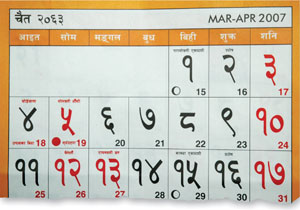 At the risk of exposing latent Orientalist tendencies, the Hand has always appreciated the pleasant sensation of being caught in a time warp here in Nepal.
At the risk of exposing latent Orientalist tendencies, the Hand has always appreciated the pleasant sensation of being caught in a time warp here in Nepal.
While the rest of the world forgets its past in blind materialist pursuits, Nepalis happily celebrate arcane festivals, ritually slaughter goats to appease terrifying deities, and honour every passing full moon. The unique calendar puts us sixty years ahead of everywhere else, despite indicators that we have some catching up to do, with auspicious days fixed by a cabal of astrologers. The month, date, and year never correspond with neighbouring countries, or anywhere else, reminding those of us from beyond the hills that we live in a very curious place indeed. Who can gaze upon Macchendranath's chariot, swaying improbably as it's pulled through the narrow streets of Patan, and not be transported back in time?
In the good old days, when humour still had a role to play, I used to think the tourist posters should read: Visit Nepal; A Country Hurtling into the 14th Century. Alas, what was once charming inevitably grows tedious and stupid when politics gets involved.
The 1990 People's Movement saw an unprecedented convergence with world trends; as the fall of the Berlin Wall and collapse of the Soviet Union freed millions from tyranny, Nepalis overthrew the corrupt Panchayat kleptocracy and achieved hard won democracy. It appeared the country was suddenly a full participant in the positive changes sweeping the globe.
This didn't last long. As communism disintegrated worldwide it thrived here, demonstrating that old habits, like sidestepping the currents of history, die hard. Typically, our local Maoists declared their deluded People's War in '96, just as Maoism disappeared in the land of its birth, as China opened to the world and embraced free market economics with a vengeance.
All this would be hilarious if the effects weren't so devastating. The only laugh in town was that, bizarrely, no one seemed aware of these monumental changes.
The profound ignorance of our political leaders is occasionally visible, like when Madhab Nepal returned from a free trip to Scandinavia a while ago. He had been invited to speak at a forum of old lefties, in his role as leader of the opposition and chief of the UML. In an unscripted moment, he told reporters how surprised he was when his Swedish hosts advised he shouldn't tell anyone his party's acronym meant 'United Marxist-Leninist'; better say he was a 'socialist', to ensure the audience didn't laugh him off the stage. Here was a man in charge of the country's second biggest party and an aspirant to the office of prime minister who didn't have a clue that the movement he represented was universally discredited.
This would be astonishing anywhere but Nepal. Countless posters have recently appeared featuring the hammer and sickle. But the banner of the erstwhile USSR, which collapsed in chaos and ignominy, has been discarded as a symbol of oppression in Russia where it flew as the national flag for over 70 years. That it flies in Nepal indicates how wrong our once-cherished time warp has gone.
Readers who label the Hand an Orientalist-cum-Anti-Communist miss the point. Marxism-Leninism-Maoism has proven to be its own worst enemy, having failed miserably as a system of governance wherever attempted, and certainly doesn't need a meddling Foreign Hand to bring it down. Being anti-communist nowadays is like being anti-Flat-Earth Society-why bother. The Hand isn't anti-communist, simply anti-failure.
World trends happen for good reasons, no matter the tired mantra our local ideologues repeat that communism failed elsewhere because it was never applied scientifically (or some such nonsense).
Nepal's distance from the rest of the world, once so appealing, has turned into the Maoists greatest ally. It serves their interest that the majority remain ignorant of such inconvenient historical facts, and somehow Nepal's 'other-worldliness' allows them to get away with it.
Betting the country's future on a horse that has already lost the race is foolish. Nonetheless, being out of step with the rest of the world could still be used to our advantage, as it affords Nepal the unique opportunity of learning from the mistakes of others, instead of haplessly repeating them.


